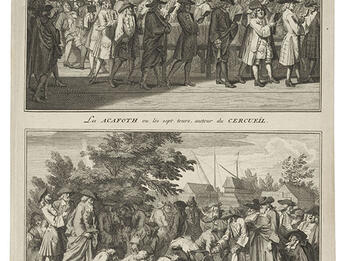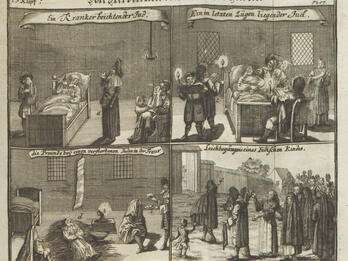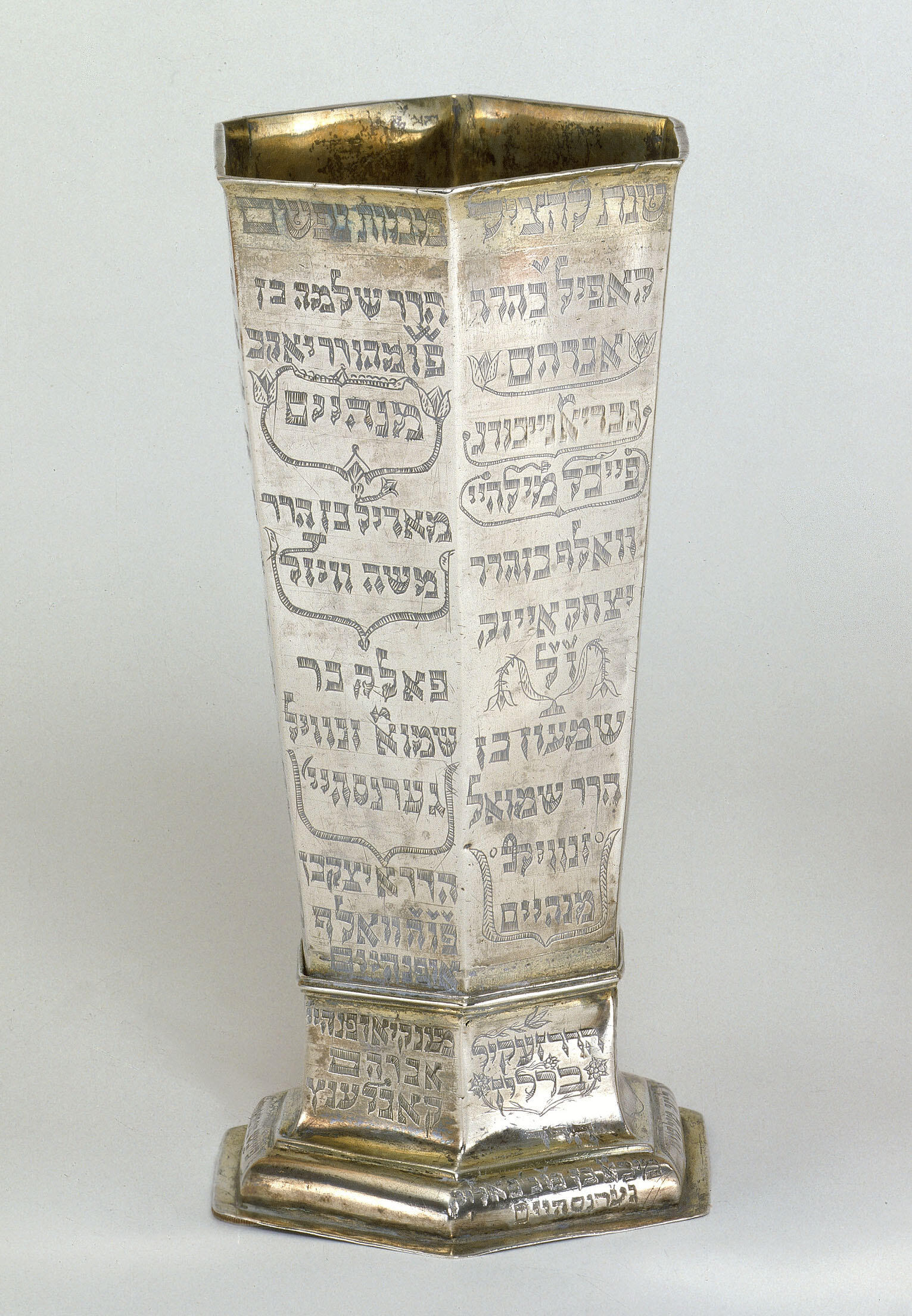Burial Society Cup
Johann Conrad Weiss
1711/1712
This silver beaker is one of two commissioned by the Burial Society of Worms in the eighteenth century. Beakers were used at the ceremony inducting members into the society at its annual banquet, which was customarily held on the seventh of Adar, traditionally designated the day of the biblical Moses’ death. Most of the space on this beaker is filled with engravings of the names of the society’s members, including honorary and former members, among them the court Jew Samson Wertheimer (1658–1724) and scholar and rabbi David Oppenheim (1664–1736).
Credits
Johann Conrad Weiss (silversmith). Beaker of the Burial Society of Worms. Gift of Michael Oppenheim, Mainz / The Jewish Museum, New York.
Published in: The Posen Library of Jewish Culture and Civilization, vol. 5.
You may also like

Funeral Activities
Between 1723 and 1737, illustrator Bernard Picart partnered with the Dutch bookseller, editor, and publisher Jean-Frédéric Bernard on Cérémonies et coutumes religieuses de tous les peuples du monde (R…
Shevet musar (Rod of Correction): On Contemplating Death
The enlightened will awaken, and he who understands will rise up to waken his soul, which will speak to his body; and his body will speak with his evil inclination.
And thus, the soul will…

Sefer ha-ḥayim (The Book of Life)
As it is written in the Zohar, Shelakh lekha: Women are privileged to merit the joy of the righteous who do the work of the Lord. They establish merit for their portion among the righteous. Men and…

Juedisches Ceremonial (Jewish Ceremony): Death and Mourning
This illustration depicting Jewish death and mourning rituals (a sick man on his deathbed, a body laid out for burial, and a funeral procession) appeared in the book, Jüdisches Ceremoniel (Jewish…
Sefer ha-tsava’ah (Book of the Testament): Rituals on Dying and Mourning
My beloved wife Esther Sheindel, may you live long, since we, on account of our affection, once made a pact, as it were, that if one of us dies, the other should implore God’s mercy for the other to…
Bine’ot deshe’ (In Green Pastures): On Visiting the Sick
Whenever you go in to visit any sick person, whoever he may be, coerce him, even against his wishes, into making a will, and do not have any concern on account of his sons and his wife and…
Engage with this Source
Related Guide
Early Modern Rabbis and Intellectuals on the Move
1500–1750
Carrying books and knowledge, itinerant rabbis and scholars traveled between communities, facilitating cultural exchange.
Related Guide
Early Modern Religious Practices
1500–1750
Early modern Jews both preserved tradition and innovated. Documents and legal texts reveal rich details about synagogue life, marriage, family relations, and death rituals.
Creator Bio
Johann Conrad Weiss
1670–1758
Johann Conrad Weiss was a silversmith active in Nuremberg, Germany, in the late seventeenth and early eighteenth centuries.
You may also like

Funeral Activities
Between 1723 and 1737, illustrator Bernard Picart partnered with the Dutch bookseller, editor, and publisher Jean-Frédéric Bernard on Cérémonies et coutumes religieuses de tous les peuples du monde (R…
Shevet musar (Rod of Correction): On Contemplating Death
The enlightened will awaken, and he who understands will rise up to waken his soul, which will speak to his body; and his body will speak with his evil inclination.
And thus, the soul will…

Sefer ha-ḥayim (The Book of Life)
As it is written in the Zohar, Shelakh lekha: Women are privileged to merit the joy of the righteous who do the work of the Lord. They establish merit for their portion among the righteous. Men and…

Juedisches Ceremonial (Jewish Ceremony): Death and Mourning
This illustration depicting Jewish death and mourning rituals (a sick man on his deathbed, a body laid out for burial, and a funeral procession) appeared in the book, Jüdisches Ceremoniel (Jewish…
Sefer ha-tsava’ah (Book of the Testament): Rituals on Dying and Mourning
My beloved wife Esther Sheindel, may you live long, since we, on account of our affection, once made a pact, as it were, that if one of us dies, the other should implore God’s mercy for the other to…
Bine’ot deshe’ (In Green Pastures): On Visiting the Sick
Whenever you go in to visit any sick person, whoever he may be, coerce him, even against his wishes, into making a will, and do not have any concern on account of his sons and his wife and…



